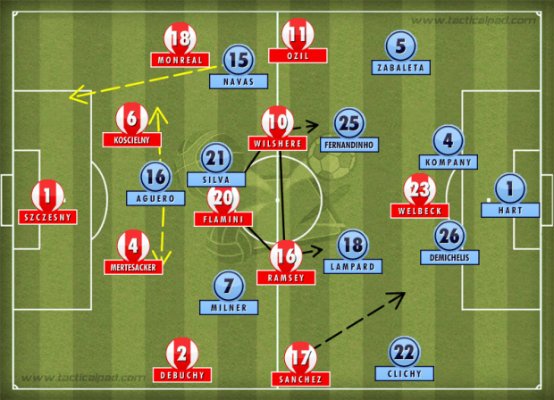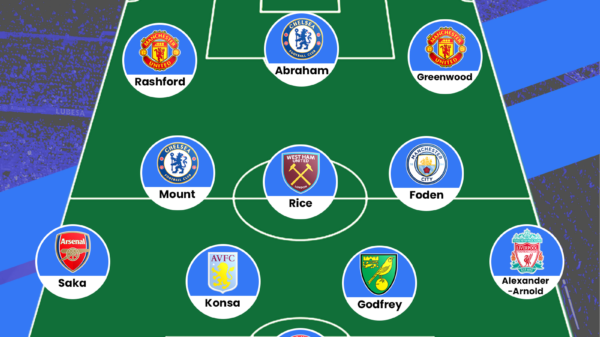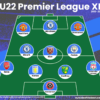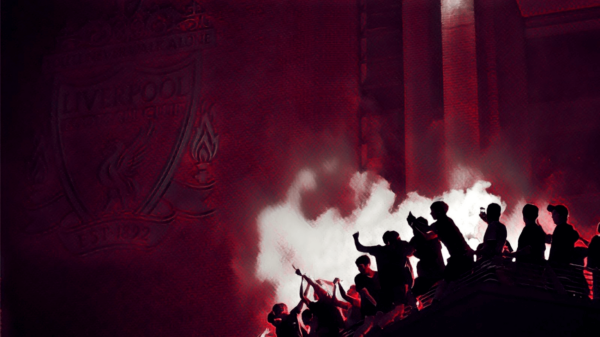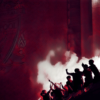Arsenal 2-2 Manchester City | Arsenal came into the game after a rather disappointing end to a window that did see them capture a man that has everything to prove, and a disappointing draw with Leicester. Manchester City had a quiet end to the window, much like their previous game which resulted in a shock home loss to Stoke City. Three points wasn’t crucial at this stage, but could prove to have been as the season wore on.
Line Ups

Arsenal: Szczesny, Mertesacker, Koscielny, Debuchy (Chambers 81′), Monreal, Flamini (Arteta 90′), Ramsey, Wilshere, Sanchez, Ozil, Welbeck (Chamberlain 88′)
Manchester City: Hart, Kompany, Demichelis, Zabaleta, Clichy, Fernandinho (Kolarov 77′), Lampard (Nasri 45′), Milner, Navas, Silva, Aguero (Dzeko 67′)
Goals: Aguero 28′, Demichelis 83′, // Wilshere 63′, Sanchez (74′)
ANALYSIS
Midfield shape of the two sides
Manchester City came into the fixture knowing that this particular one is followed by two crucial games against Bayern Munich and Chelsea; the need to rotate compiled with Yaya Toure’s late return from international duty meant that Manuel Pellegrini gave Frank Lampard his first ever appearance in a City shirt and Fernandinho his first start of the season. Not the weakest, but certainly a worrying midfield duo in this important game. Arsenal on the other hand went with Mathieu Flamini as the deep midfielder covering the defence and looking to control any activity in between the lines; while Jack Wilshere and Aaron Ramsey were on either side of him with the intention of breaking up City’s play and turning those into attacks quickly with swift passes & movement.
The Lampard-Fernandinho partnership did suggest a restrained approach by the champions, looking to sit deep, soak in pressure, and hit on the counter. A draw, by the looks of it, was a result Pellegrini would take prior to kick-off. Although Lampard has made his name more in attack, and more so from the box, his activity was as the formation suggested, deeper. But it also allowed Arsenal to create attacks, with quicker transitions led (surprisingly) more so by Jack Wilshere than Aaron Ramsey. The pace injected by that duo was difficult for City’s midfield to control. Although Fernandinho did do a good job in those deeper areas, it was Arsenal who would edge the midfield battle. David Silva ofcourse was the advanced player ahead of City’s two central midfield players, with an obvious attacking employment, than a defensive one.

Wilshere and Ramsey did combine for the equaliser, very neatly indeed, but it was their work rate to break up play that was fabulous to watch, especially Jack. The Englishman who has come under constant criticism, and rightly so, upped his game with a constant willingness to move ahead, picking up loose balls, challenging opponents and driving into the box. As the image above indicates, Wenger was spot on with that approach, Flamini holding the midfield well, with a commendable 5 interceptions and a 95% pass completion rate. The two ahead of him completed the most passes for the Gunners, 132 between them, as this trio helped in keeping the zone under control, also preventing direct central link-up between Silva & Aguero. It seems like this approach has become the standard against Manchester City, a deep player covering and two ahead of him, slightly wider using their energy, with Liverpool trying a similar approach at the Etihad.
Arsenal’s defensive weakness, easily taken advantage of by Man City
One worry for Arsenal, post-window, was the lack of defensive options in the squad, something which has further been highlighted with Mathieu Debuchy’s injury. Arsenal currently have only four fit defenders to play across the backline, with the back ups being youth players with little or no senior experience.
This weakness was pounced on by an ever efficient Manchester City side. Pellegrini’s men were constantly able to play passes past Arsenal’s defence with complete comfort & ease. The home sides’ defenders were often guilty of being left static or out of position, allowing Man City’s pacy players to take advantage. Sergio Aguero did so, but Jesus Navas was the more evident beneficiary here.

As seen for Manchester City’s opening goal, both Nacho Monreal and Navas had a similar starting position at the half-way line (with Monreal being a bit more deeper). Once the ball was played through onto City’s right flank, Monreal was always going to play catch-up, and fail at it, with no chance of tracking the pacey Navas. That was the first defensive positional error made by Arsenal there, then Koscielny seemed to have got his angles wrong in defending against Navas, allowing him to comfortably play a ball through without really challenging him off it, before Aguero’s pace was the final superiority seen from the away side, getting ahead of the defender to score the opener.
This positional problem and slow movement/reaction in Arsenal’s defence created plenty of opportunities for Manchester City, not all that resulted in a clear cut chances, but worrying signs for the home side, while City on another day could possibly have been more clinical than they were.
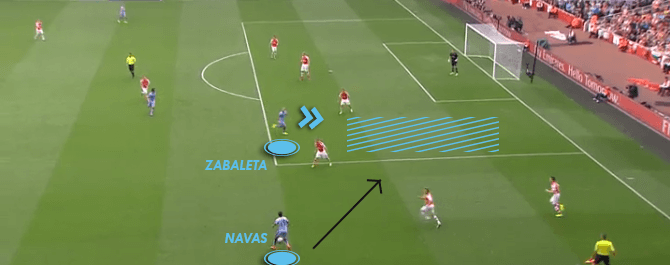

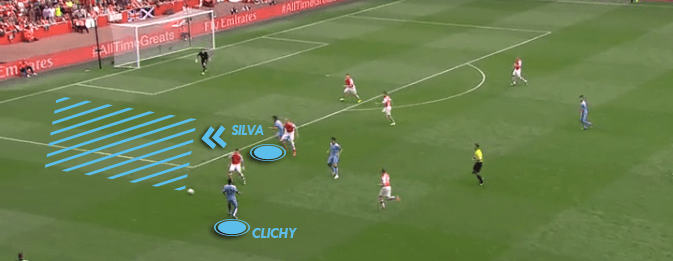
Although Koscielny and Mertesacker form a solid central defensive partnership, and Calum Chambers has had an impressive start to his Arsenal career and could continue in his favourable right-back position, Monreal remains the main worry and weakness in that backline; a problem that could disorganise the entire four man system. As for Manchester City, this further reemphasised their strenghts in attacking movement, running the channels and the flanks in behind opposition’s defensive set-ups.
Improved possession, further isolation and slow transition
Some appreciation for my poetry there above. No?
Although Manchester City went in leading at half time showing superior efficiency, it was Arsenal that seemed to be the more impressive side with encouraging signs. Danny Welbeck looked to be settling into the game as well, pulling off a near perfect chip over Joe Hart. City had the lead, Arsenal had the control.
But that efficiency of City showed further in the second half, with the Citizens able to take a hold of the game and retain possession much better than they did in the first 45. Counter-attack was the approach then, and it paid off; holding that lead seemed to be the next step. Manchester City certainly grew into the game better, stringing more passes along, not necessarily threatening it terms of creating chances but rather frustrating Arsenal by ensuring they remain off the ball.
This also further pulled the Arsenal team back, to contain this Man City possession with defensive organisation. Contain they did, but what is also resulted in inevitably was the complete isolation of Danny Welbeck whose good start almost completely faded away. Fatigue got the best of him eventually, but his effect & impact was almost negligible as the game went on primarily due to that isolation and lack of regular service. With Arsenal being further pushed back, the distance between the rest of the team and the man upfront only grew further with City’s defensive duties eased.
Ofcourse Arsenal did get back with two quality goals, but interestingly they weren’t as good as they were in the first half. Although they started quicker and pressed better, it eventually rescinded even to the point where their transitions seemed considerably slower. They weren’t quite as quick in getting the ball from the defense to attack via the midfield, nor were they able to replicate the urgency in getting back into defence from attack. It meant that City’s midfield benefited with large amount of space and time in that central midfield area, the very battle which Arsenal were otherwise winning.
Credit again to Manchester City for the way they responded after conceding those two goals when it so easily could have resulted in a panicked reaction. They again started taking control of the possession, getting more bodies forward in support and not losing the calmness they displayed throughout the 90. The equaliser did come, Demichelis unmarked almost exactly at the penalty spot but Pellegrini’s men didn’t stop there. The pressure was all coming from the sky blue side with a likely winner seeming like an away one; twice they struck the post late on and had Szczesny to thank as three good chances opened up.
Where does this leave them?
Arsenal are still unbeaten but have dropped points in three of their four Premier League games so far; nothing to panic about but their defensive issues could severely hurt their capabilities in the coming weeks. Manchester City have already disappointed a few, though it’s isn’t time to draw conclusions yet. Bayern Munich and Chelsea await in the next two.
Written by Sami Faizullah
You can read all our Tactical Analysis here.




















































